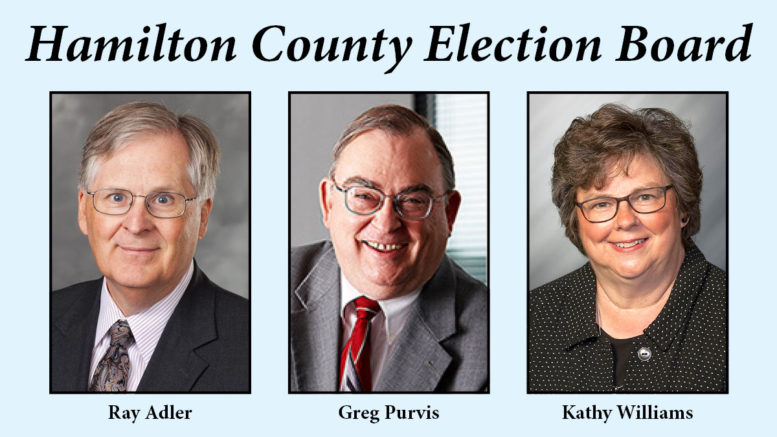The Hamilton County Election Board on Wednesday voted to dismiss Democratic Chairman Joe Weingarten’s request for a full evidentiary hearing regarding allegations of Carmel Mayor Jim Brainard’s campaign offering money to mayoral opponent Fred Glynn to not run in the 2019 Primary Election.
At the Election Board meeting, during questioning by board member Greg Purvis, Weingarten stated Glynn told him he was offered money to withdraw from the race. Weingarten did not say who offered Glynn the money, stating Glynn told him it was the Brainard campaign.
Weingarten confirmed to Purvis that he was requesting the board to issue subpoenas and hold a full evidentiary hearing in this matter or for the board to ask the county’s prosecutor to do it. “Somebody needs to get to the bottom of this,” said Weingarten.
Present at the meeting were attorneys Joseph Chapelle, representing Brainard’s campaign; Tim DeLaney, representing former Glynn campaign manager Dan Hennessey; and David Brooks, representing Laura Campbell and the Hamilton County Republican Party.
Brooks pointed out inconsistency in what Weingarten had brought to the election board.
“Mr. Weingarten has provided inconsistent testimony; he submitted an article claiming there was this $140,000 number and now it’s $40,000,” said Brooks. “He says he’s talked to Fred Glynn, yet he didn’t bother to ask him any questions you need to know. Given that it is hearsay, he didn’t ask him (Glynn) to show up and give any evidence at all … The amount of evidence in front of you at this point is woefully inadequate for you to reach a conclusion that there is a substantial reason to believe that an election law violation has occurred.”
Chapelle told Election Board members, “Long-standing Indiana law would be, in an administrative hearing such as this, a decision cannot be based solely on hearsay. The only evidence that has been presented to this body is an article printed in the Carmel Current.”
Brooks called Weingarten’s complaint frivolous and asked board members Ray Adler, Kathy Williams and Greg Purvis to dismiss the complaint.
Purvis, the only Democrat on the election board, said, “This hearing was not meant to be a full evidentiary hearing. It was my understanding it was to be a probable cause hearing.”
Purvis, when referring as to whether the election board should move forward on Weingarten’s complaint, said, “I think we risk violating the public’s trust. I think we should have a full evidentiary hearing, even if it turns out to be a ‘nothingburger’ at the end … I very much oppose to sweeping this under the rug without having a full evidentiary hearing.”
Purvis motioned for the board to conduct a full evidentiary hearing. The motion did not receive a second and died.
After Purvis’ motion failed, Election Board President Ray Adler said, “I want to make a comment to the press. The term bribe is a hot button that has nothing to do with anything that happened in this case and I would hope the press would not use that term. It doesn’t do anything to add to the academic debate. I think by uniform agreement of the five lawyers in the room it doesn’t apply legally.”
Williams followed Adler’s comments by saying, “I would like to make a motion that we dismiss this complaint due to no probable cause existing at this time.” Adler seconded.
The board voted 2-1 not to move forward with Weingarten’s complaint, with Purvis voting against Williams’ motion.

